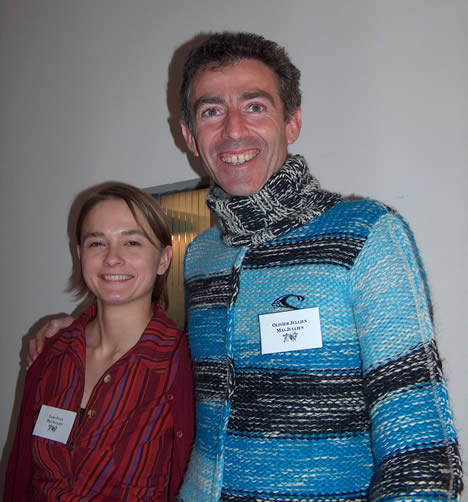|
The wines
of Mas
Jullien, Jonquières, Languedoc

In recent years the Languedoc region of France has seen
the emergence of a score of fine wine domains. Among these is Olivier
Jullien’s 15 hectare estate. It was established in 1985, and
consists of two distinct terroirs, one that is predominantly calcaire,
and the other of argilles (clay and silica). It’s clear that terroir
matters to him.
His father was a vigneron who sold his grapes to the
local coop. When Olivier decided to make his own wine, he didn’t use
his father’s vineyards, but bought his own. Later on his father
decided to make wine himself, and began producing the well respected
Mas Cal Demoura wines in the early 1990s.
Olivier makes a white, but professes not to drink white
wine. His red wine range has been rationalized to just two: the Mas
Jullien, a blend of Syrah and Carignan, with a touch of Mourvèdre,
and the Etats d’Ame, which gives him freedom to try new things and
make an early drinker – this has some Grenache and Cinsault in the
mix. ‘I love the combination of Syrah and Carignan’, says Olivier.
Olivier has been playing around with his vineyards, and
has actually ended up reducing them from his original 1985 holding of
20 hectares. I quizzed him about the natural wine movement that
receives so much attention in France. ‘I think it’s a good thing
because it has led people to reduce their sulfur dioxide use’, says
Olivier. He played with making a vins sans souffre, but gave up.
‘No-sulfur doesn’t work’, he says, ‘but too much is not good.
You must add some after malolactic and before bottling. Without any
sulfur you get the same wine every year, from every terroir’. In the
vineyard Olivier says he has been working organically and sort of
biodynamically for a long time, but he doesn’t bother with
certification.
The mini-vertical of these wines showed really well,
and gave some evidence that these are wines that will develop in
bottle. Prices are retail, as given by UK agents Richards Walford (www.r-w.co.uk
– a wonderfully minimalist URL). The wines are also available from
Languedoc specialists Grand Cru Wines, who first introduced me to this
superb producer with a dodgy taste in jumpers.
Mas Jullien Blanc 2005 Coteaux du Languedoc
Honeyed, sweet nose. The palate is fresh, a bit nutty and has some
vanilla, spice and lemony freshness. Quite rounded. Attractive. 89/100
Mas Jullien Etats d’Ame 2004 Coteaux du Languedoc
Quite sweet and aromatic on the nose, with smooth ripe red fruits
and a bit of bite. The palate is savoury and expressive but with nice
spicy red fruits. Chewy, spicy structure. A nice, expressive wine.
88/100
Mas Jullien 2004 Coteaux du Languedoc
Sweet, open aromatic nose with some seriousness: it’s dark and
full; complex and spicy. The palate is bold with concentrated sweet
red and black fruits combining with nice minerality and good acidity.
Great balance here. 92/100 (£18.99)
Mas Jullien 2000 Coteaux du Languedoc
From magnum. Ripe, sweet fruit on the nose with a lovely earthy
edge. Complex and mineralic. The palate is quite open and complex with
lovely spicy, earthy fruit and dark spiciness. Wonderful stuff. 94/100
(£56.99 per magnum)
Mas Jullien 1999 Coetaux du Languedoc
Earthy, savoury, complex nose of ripe sweet fruit with a
chocolatey, spicy richness. The palate is earthy and spicy with lovely
density and good complexity. Evolving nicely now. 92/100 (£27.75)
Mas Jullien 1998 Coteaux du Languedoc
Sweet open nose showing ripe, rather elegant red fruits. The
palate shows some evolution but with lovely round, pure fruit. [I
forgot to rate this at the time.] (£27.75)
Wines tasted 01/07
see
also:
Find
these wines with wine-searcher.com
Back to top
|

